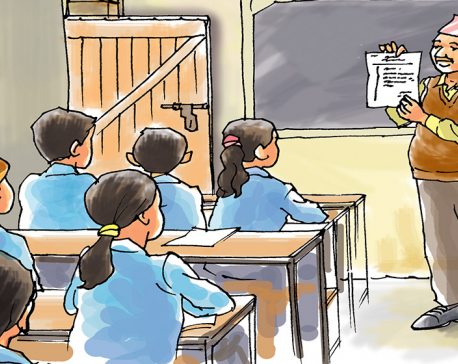
OR
BP Cancer Hospital
The decision of the Board of Directors of BP Koirala Memorial Cancer Hospital in Bharatpur, Chitwan, the largest cancer hospital in the country, to bar its doctors from working out of the hospital is timely. This could be a blueprint for similar reforms in other public hospitals in Nepal. For in addition to barring its doctors from private practice, the reform at BP cancer hospital also gives its doctors an alternative means of adding to their pay packet. One way the doctors will be able to do so is through an expanded Out Patient Department (OPD), where the doctors can now see private patients after their daily hospital duties are over. Another means of their earning will be teaching in the hospital, which is now to be converted into a specialty cancer institute that trains cancer doctors and nurses. A win-win formula has been worked out. For instance the bulk of the amount that doctors earn from their OPD services will go into their personal accounts, while a small portion will be used to compensate other hospital staffs like lab technicians and nurses. Even with these changes the hospital board claims that the OPD the hospital operates will still be cheaper compared to the OPD of private cancer hospitals.
In fact, this is precisely the kind of medical education reform for which Dr Govinda KC has repeatedly risked his life. Why can’t the state of government hospitals, on which the vast majority of Nepalis rely for their health and wellbeing, be improved so that people from all walks of life start visiting public hospitals rather than their more expensive private cousins? This is not to say we should do away with private hospitals. If some people still choose private care, they should have that option. Moreover, some of our well-managed private hospitals can be examples to follow for the rather chaotic public hospitals. It’s not just about private hospitals having more money. One area our public hospitals could definitely learn from private hospitals is customer care. Other than this, the problem is that even though the government has set aside plenty for public hospitals, rarely is this money put to good use. For instance the funds made available to public hospitals to procure free medicines are often frozen as the prolonged bureaucratic procurement process cannot be completed within the fiscal year for which they were earmarked. And when there are medicines, there might not be any doctors available to dispense them.
Whatever the case, the state of our public hospitals will improve only when they first have enough trained medical personnel. This can be done through measures like the one recently taken in BP Cancer Hospital. But this won’t be enough. A way must be found to tie down our trained medical personnel, especially those who study in government scholarship quotas, to rural hospitals for at least four to five years. Moreover, if the doctors on government scholarship who have already passed out refuse to go to rural areas, their license could be cancelled. There is no reason our public hospitals can’t be among the best in the country, if there is political commitment to do so. Health Minister Gagan Thapa has made all the right noises so far. But we are sure even he realizes that there is still a long way to go.
You May Like This

Nepal-Qatar Relations: Prioritize promoting interests of Nepali migrant workers
The two-day state visit of Qatar’s Emir Sheikh Tamim bin Hamad Al Thani, the first by a head of state... Read More...

Take necessary measures to ensure education for all children
Thousands of children, with bright minds and hopeful futures, are still denied the fundamental right to education in Sarlahi district... Read More...

Not without reform
Finance Minister Muhammad Aurangzeb says that the economy has the potential to grow 10 times its size to $3tr for... Read More...

Just In
- World Malaria Day: Foreign returnees more susceptible to the vector-borne disease
- MoEST seeks EC’s help in identifying teachers linked to political parties
- 70 community and national forests affected by fire in Parbat till Wednesday
- NEPSE loses 3.24 points, while daily turnover inclines to Rs 2.36 billion
- Pak Embassy awards scholarships to 180 Nepali students
- President Paudel approves mobilization of army personnel for by-elections security
- Bhajang and Ilam by-elections: 69 polling stations classified as ‘highly sensitive’
- Karnali CM Kandel secures vote of confidence


















Leave A Comment